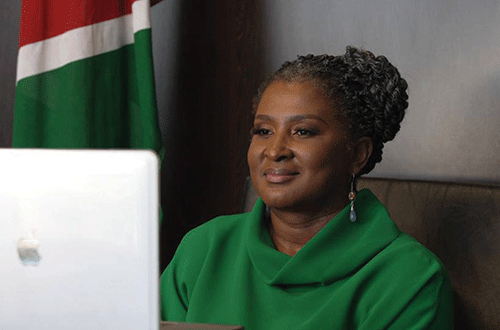First Lady Monica Geingos said inequality drives pandemics, compromise solutions, increase vulnerability to HIV, and impede access to healthcare services, standing in the way of people’s dignity and rights.
Geingos said partial response to HIV, coupled with emerging pandemics has given rise to complacency that must be reversed.
“Inequalities do not just exist within countries; they exist between countries and are defined by money, which determines who lives and who dies. This is why addressing inequalities is pivotal to the work that UNAIDS does,” said Geingos this week at the 53rd Meeting of the UNAIDS Programme Coordinating Board (PCB).
She was joined by some members of the Global Council on Inequality, AIDS, and Pandemics.
Geingos added that human rights must be always upheld, for all people, under all circumstances. She added that the UNAIDS is a unique body as it includes communities and civil society as members alongside member states and its cosponsors.
The Global Council on Inequality, AIDS and Pandemics is a consequence of the visionary Global AIDS Strategy, adopted by the PCB in 2021, that recognised the need to address inequality as a primary means to end AIDS as a public health threat by 2030.
“This meeting happens at a moment when we need to be reminded of the global solidarity that has defined the HIV response and has saved millions of lives. A response that enjoys the gains achieved from a rights-based, human-centric, and data driven approach that must remain above religious, ideological, and political pressures, and must focus on inequalities in all their forms,” said the First Lady.
She said inequality is at the heart of resolving several challenges in countries like Namibia, a country that is the second most unequal country in the world from an income inequality perspective. Resolving inequality takes time, said Geingos.
“According to Joseph Stiglitz, resolving inequality is a policy choice and he is right. “It is also true that even if you get the right political leadership and make the right policy choices, it will take time for those policy choices to manifest in better statistics and outcomes in pandemics, HIV, and gender equality,” he said.
The executive director of UNAIDS, Winnie Byanyima said their responsibility to affected people will remain until there’s a cure or a vaccine. “We will be able to shift from an emergency response to sustaining access to medicines,” she said. She added that 2030 is around the corner, the year by which the world has committed to end AIDS as a public health threat.
“We can have a world where instead of losing a life to AIDS every minute, all who need treatment can access it. A world where no one faces discrimination,” said Byanyima.
She requested all countries to identify inequalities, revolutionise prevention, update policies, increase resources, and team up to get the best HIV technologies.


